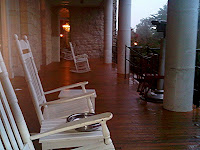Deal or No Deal! I don't know why I watch that television game show. I surf past it, intent on moving on, but invariably it sucks me in and spits me out with a nasty thump.
I've never managed to watch one of the episodes where there was a big winner and I always manage to feel bad for the contestant who "loses" even when they win decent money. When a million is on the table and you only walk away with $20,000, that $20,000 feels like a loss to them and to the audience. And that's just crazy.
If you've been lucky enough to avoid the show and have no idea what I'm talking about – let me share the basics.
Howie Mandel hosts the show. Remember him from
St. Elsewhere? Wonderful actor.
Contestants play for a top prize of $1 million dollars on the hour long version of the show, or $500,000 on the half-hour long version.
It's a game of odds and chance. There are 26 "models" or sometimes "regular" people from the audience who stand on an elevated stage similar to bleachers. Each person is in charge of a numbered briefcase. The briefcase contains a sign with a certain about of money on it. The range is a penny to one million dollars. Once a suitcase is opened, the money amount in it is out of play.
The contestant is given a locked suitcase at the beginning of the game. He or she can choose to keep their case or exchange it for one of the others. Once that decision is made, the game begins.
The contestant must pick a pre-determined number of cases – trying to avoid the ones with the larger amounts of money in them. After each set of cases is opened (or taken out of play), the contestant is offered by a mysterious banker an amount of money to end the game. The amount is based on the number of remaining cases and the amount of money still in play. "The Banker's" offer is usually about 1/3 of the amount that's possible at that particular time. Howie Mandel asks, "Deal or No Deal?" The contestant takes the deal or continues playing; hoping the next offer is higher. Of course if in the next round, the contestant opens a case with the top amount in it, then the next offer will drop like a stone. The contestant keeps playing until he accepts a "deal" or there is only his case and one other left. Without a "deal," the contestant will walk away with the contents of his case – the one given to him at the beginning of the game.
The interesting part of the game is always the contestants. They come from all walks of life, young, old, male, female, bold, timid, smart, not so smart – you name it they've all been on the show. You never really know who the risk takers are going to be until about mid-way through the show. And you never know who is going to win big or go home with a penny. The problem I have with the game is that those who deal out early, will probably regret what might have been if they'd held on for one more round. And they don't have to guess what would have happened. Howie asks the contestant to play it out for fun, asking which would have been their next case, they open it, the banker makes an offer, etc. I've seen a few people win millions under the "what-if" scenario. Now those people really feel bad. They paste on fake smiles and say they are happy with the amount they cut a deal for, but it's easy to see they are going to be kicking themselves or their spouses for months.
But then again, those who refuse a large offer (maybe twice their yearly salary) in the hunt for that million dollar payday can walk away with nothing. And that hurts too.
I think one of the reasons I don't like this show's premise is that there is no skill involved. The contestant randomly picks cases. The game really falls flat when the first case that's opened holds the million dollars. And often increasing the odds doesn't help anyone. I've seen shows where as a special event, they have five cases with a million dollars. I never saw anyone walk away with a million.
Last night a school teacher was offered $41,000. There were only a few cases left in play, one of them had $500,000 in it. The teacher turned the offer down, instead going for more money. The next case he opened had the $500,000 in it – meaning that amount was out of play. The next offer from the banker? $9,000.
The teacher took it. I felt terrible for him. I'm sure when he gets home and thinks about it, that $41,000 is going to look much bigger than it did while staring at a possible half million. He turned down a year's salary. I don't think it was greed. I think he wanted to act boldly, to take a risk. Our society admire risk takers. But ...
Sometimes taking a risk, is just... risky. It's not admirable or bold or ambitious. Maybe it's just me, but I scream at the television, "Don't listen to the audience! Think what you could do with $41,000!. That amount could pay down your mortgage. Or buy you a new car. Or send you on a trip round the world. Take the deal!"
They never listen to me.
And the $9,000 the teacher did win? He probably feels bad about it.
$9,000! Wouldn't you be thrilled to win that?
Or would you only remember what you lost?
Evelyn David
http://www.evelyndavid.com/
















